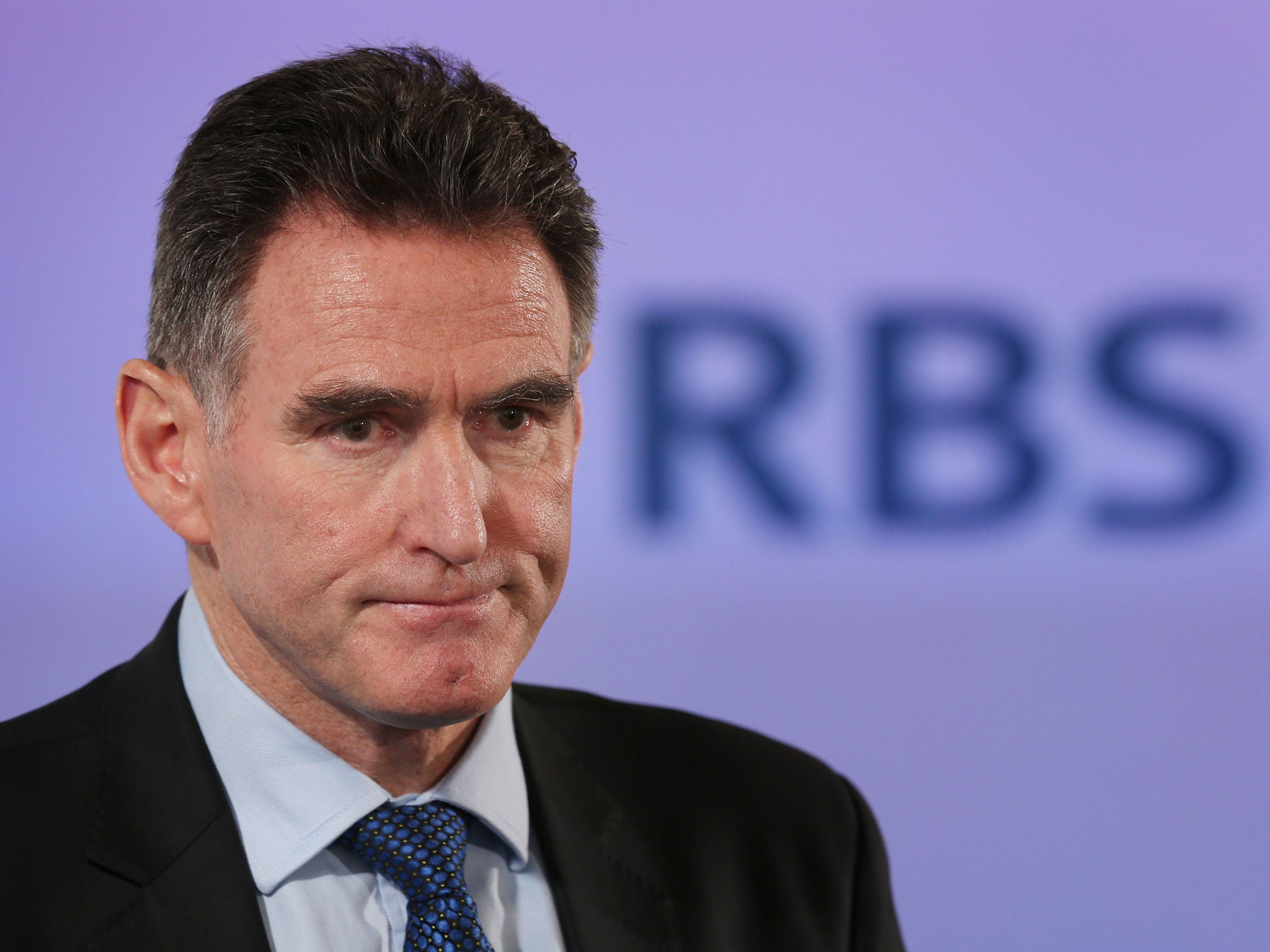Ross McEwan leaves RBS with mixed legacy
The CEO is stepping down after five-and-a-half years in charge of the bank. Fianncially it's in much better shape but troubling questions over its culture remain

Your support helps us to tell the story
From reproductive rights to climate change to Big Tech, The Independent is on the ground when the story is developing. Whether it's investigating the financials of Elon Musk's pro-Trump PAC or producing our latest documentary, 'The A Word', which shines a light on the American women fighting for reproductive rights, we know how important it is to parse out the facts from the messaging.
At such a critical moment in US history, we need reporters on the ground. Your donation allows us to keep sending journalists to speak to both sides of the story.
The Independent is trusted by Americans across the entire political spectrum. And unlike many other quality news outlets, we choose not to lock Americans out of our reporting and analysis with paywalls. We believe quality journalism should be available to everyone, paid for by those who can afford it.
Your support makes all the difference.Cheerio then Ross McEwan.
The RBS boss has resigned after five-and-a-half years in post saying it’s the “right time” for him to go.
The announcement, made just prior to the bank’s AGM, was well timed, taking some of the sting out of the row over his £3.5m pay package, which voting advisor PIRC recommended investors oppose.
McEwan, 61, often stated his desire to make RBS a “good safe bank” of which “people can be proud”.
In terms of the former, it’s far safer than it once was. Shore Capital was quick out of the blocks with a note praising him for leaving it “in much better shape” than when he took on a job few wanted.
The bank is turning a profit again after the best part of a decade in the red. It pays a dividend. Regulators no longer bite their finger nails at the mere mention of its name.
McEwan was also able to see off most of the “legacy” issues it faced, overseeing the payment of a series of thumping fines for its involvement in scandals such as Libor interest rate and foreign exchange fixing, capped by a $4.9bn (£3.8bn) settlement with authorities in the US who were pursuing it for flogging dodgy mortgages in the run up to the financial crisis.
Investors were denied the chance of seeing former boss Fred Goodwin on the witness stand when, on the eve of a court hearing over the controversial pre financial crisis rights issue, the bank blinked and offered an improved settlement.
But while the Treasury has started to sell off the state’s stake in the institution, the shares remain well below what it would need to turn a profit on the money taxpayers pumped in to keep it afloat in 2008, and well below the high point they reached on McEwan's watch. It came on December 2014 when the stock closed above 400p. RBS now trades at around 150p below that.
Then there is the question of whether the bank is an institution anyone can be “proud of”.
That's perhaps the biggest knock on McEwan, the reason he departs with such a mixed legacy.
It’s worth paying attention to the words of Ian Fraser, the author of the mightily impressive ‘Shredded’ covering the bank’s fall from grace, at this point.
Fraser probably knows this institution better than any other outside observer and a new edition covering McEwan’s time in charge is coming soon.
He says the bank has improved and credits McEwan with having made impressive strides towards normalising it. But significantly, he has concerns over the bank’s apparent culture, making particular note of the way it dealt with the scandal over the behaviour of the Global Restructuring Group for distressed business borrowers.
“Cultural change is far from ubiquitous. The most glaring example was RBS’s refusal to acknowledge the extent of the wrongdoing that occurred inside GRG, or the harm the unit has done to thousands of business customers,” he says.
Fraser says the new edition of Shredded will provide a number of examples of an apparent deeply problematic culture persisting at RBS.
But its failure to spin off Williams & Glyn counts as another black mark. Billions were spent readying the business bank for divestment, which was the EU’s price for allowing the multi billion pound taxpayer bailout RBS received during the financial crisis. It failed, and an alternative plan to release funds to help challengers had to be hatched as a replacement.
McEwan also said he wanted RBS/NatWest to be ‘number one for customer service, trust and advocacy. He didn’t achieve that goal either, and a branch closure programme infuriated many people in the country whose name the bank bears.
Alison Rose is the internal favourite to succeed him and has support in the City. It would be a smart move for RBS to appoint its first female CEO.
The main knock on Rose is that she has spent 20 years in the problematic culture that Fraser highlights.
Join our commenting forum
Join thought-provoking conversations, follow other Independent readers and see their replies
Comments